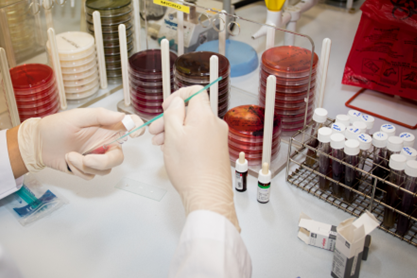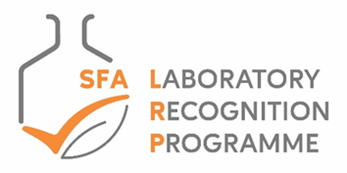Summary
|

Testing of food for signs of foodborne hazards such as bacteria, contaminants and pesticide residues is a critical component of Singapore’s efforts to ensure food safety.
To ramp up Singapore’s food testing capabilities and meet the high demand for testing services, the Singapore Food Agency (SFA) rolled out the Laboratory Recognition Programme (LRP) in 2019. The LRP network of laboratories not only supports SFA’s food regulatory and monitoring functions, it also helps the local food industry and food traders with their food testing needs.
SFA’s Laboratory Recognition Programme
To ensure the quality of test results produced by LRP-recognised laboratories, SFA requires that laboratories looking to be LRP-recognised undergo a rigorous two-stage certification process that consists of the initial application stage and an annual renewal stage. To apply, laboratories have to provide supporting documents to prove that they are competent in the testing parameters that they are applying for under the LRP. This includes accreditation from the Singapore Accreditation Council (SAC), participation in international proficiency testing with satisfactory results, and other technical documents and reports. Officers from the National Centre for Food Science (NCFS) also conduct on-site checks to verify the laboratory’s compliance with LRP requirements.
Private laboratories recognised under the LRP are easily recognisable by the LRP certification mark.

LRP’s certification mark consists of a flask outlined by a leaf and an orange tick. The flask and leaf depict the laboratories’ comprehensive and stringent tests, while the orange tick depicts SFA’s recognition.
By establishing a network of private testing laboratories recognised by SFA, food manufacturers and other members of the food industry gain greater access to efficient and high-quality food safety testing services.
Choosing a partnership approach
Food safety is a joint responsibility, where all parties – from the Government to the industry and the consumer – play their part. The LRP, a partnership between the Government and private laboratories, has reaped benefits both ways and for the food industry in general.
In Singapore, testing services are required to support areas such as export certification for traders and the food industry, SFA’s import control, market monitoring and surveillance programmes, and to support quality control in the food industry. Since its inception in 2019, the LRP has resulted in an 80% reduction in lead time for food export certification. The number of recognised tests has also increased by more than 50%. Not only has this strengthened Singapore’s food safety efforts, food security in Singapore has also been bolstered with the enhanced food safety testing capabilities that the LRP network provides. This is especially useful as Singapore diversifies its import sources to mitigate the impact of disruption to any single source, and food safety tests ensure the continued safety of food imports.
In turn, many of the LRP-recognised labs have found that the programme has helped to raise their overall quality standards. To support the food safety system in Singapore more effectively, NCFS has been assisting LRP-recognised labs to strengthen their testing capabilities. This includes:
- Developing new tests that adhere to ISO/IEC 17025 standards;
- Appointing authorised analysts from LRP-recognised labs to conduct food safety testing;
- Conducting on-site verification to ensure continuous compliance with LRP terms and conditions; and
- Maintaining competency through technical sharing, on-site training, and organising of Proficiency Testing programmes and Inter-laboratory Comparisons.
.jpg?sfvrsn=2926e60f_0)
On-site technical trainings, engagements with LRP-recognised laboratories, and hosted visits to NCFS are conducted by NCFS regularly to strengthen testing capabilities and raise standards.
At the same time, the programme has also given several LRP-recognised laboratories a business advantage. Besides increasing customers’ confidence in the laboratory’s testing capabilities, LRP-recognised laboratories have reported receiving greater exposure and more queries from potential customers on their available services.
All part of the plan
Arriving at this outcome was all part of the plan for the LRP, the idea for which Madam Koh Shoo Peng, Consultant Scientist at NCFS, shared came as a natural progression in SFA’s ongoing journey to advance and strengthen food security and food safety in Singapore.
“We saw that there were a lot of synergies and mutual benefits just waiting to be tapped on. We, as the regulator, needed to ramp up our testing capabilities, and what better way than to partner with labs that were already up and running.
Our scientists had the expertise to assist labs with the upgrading of their technical competencies and test scopes, while the labs could certainly benefit from the increased business opportunities that came from participating in SFA tenders, as well as providing export certification to food industries.”
Today, the hard work of setting up the LRP has paid dividends. The number of recognised labs has not only been growing steadily, the range of recognised test scopes has also increased to cover a more comprehensive range of food safety testing.
Reflecting on LRP’s journey thus far, Madam Koh summed up: “The LRP-recognised labs are good strategic partners both during peace time and in the event of food safety emergencies. We will continue to build the LRP network through continuous engagement, technical exchanges and competency building. Because only together can we build a comprehensive, resilient and trusted food safety testing network for Singapore.”
Are you a…
Food Industry Member?
Members of the food industry can engage the testing services of SFA’s recognised laboratories to meet your food testing needs. Check out the range of services available.
Private Laboratory?
Refer to SFA’s LRP page for more information on applying to be a LRP-recognised laboratory.
Why is there a need for food testing services in Singapore? To keep up with the growing demand for food both locally and globally, the food industry in Singapore has been undergoing rapid expansion over the last couple of years. However, as our food services industry grows, so does the need for food testing services. Such services ensure that our foods are free from harmful substances such as microbiological indicators, foodborne pathogens, mycotoxins, inorganic contaminants, organic contaminants, food additives, food radioactivity, pesticide residues and drug residues. Specifically, testing services are essential in supporting the following activities: 1. Export certifications for traders and food industries; 2. Testing to meet SFA’s import control measures; 3. Ongoing market monitoring and surveillance programmes; and 4. Commercial testing to support quality control of food industries. These testing services, which were previously provided exclusively by SFA, have been progressively outsourced to private laboratories since the inception of LRP in 2019. |



